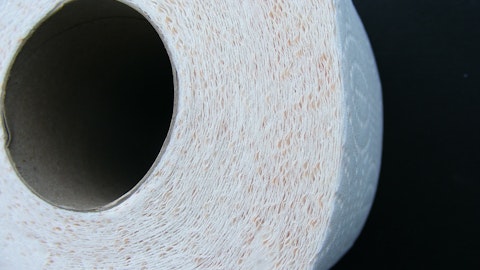Gabe Hajde: Okay. Thank you. And appreciating that it’s tough to talk about it live like this; but I saw an article yesterday talking about some of the differences or vagaries of how paper businesses are performing in Russia? Again, the thing you can comment, could anything change with respect to the process there? And if things go sort of as planned, can you give us an update in terms of timing as to when the cash might come in?
Mark Sutton: It’s really, really hard to give you an update on the time. As we said, we lack one approval on the competition authorities and that’s a multi-point – multipart approval. We’ve got all of those parts. And so I think with what’s been going on in Russia, that’s unrelated to foreign companies exiting and all that the things happen with – with the government and the military issues, I think it’s a bit of a distraction factor for getting these kinds of jobs completed. I will say though, the IP Ilim transaction is on the larger end of things that have occurred. So it gets higher levels of scrutiny and the people doing the approvals are at a higher level, and they’ve obviously been really busy with other things not related to this.
So I wish I could give you a better timing. Our partners who are the potential buyers are working it constantly. They’re working their normal contacts with the government, trying to get it to the finish line. If I gave you a prediction, it would just be an educated gas, which as we know is not – is not worth much. And Tim, if you want to add something to that?
Tim Nicholls: Just, I think Mark is right, the timing on the approval is impossible in the gauge. Once approval were to be obtained, the flow-through on closing the transaction or preceding cash is very clear.
Operator: Your final question today comes from the line of Matthew McKellar with RBC. One moment while we open your line. Go ahead, please.
Matthew McKellar: Hi. Thanks, good morning. I’d like to ask about your Global Cellulose Fibers business. So recognizing you talked about your focus on customers who value the attributes of your fluff pulp. Maybe thinking about the market more broadly, can you talk about any impact you’ve seen over the past few quarters from certain consumers substituting lower-cost grades? And then maybe whether you’re seeing any changes in that substitution date with fluff pulp pricing coming off peak? Thanks.
Mark Sutton: Matt, that’s a good question. Clay and his team are all over really understanding this whole substitution phenomenon. Clay, if you can comment on what we know about that and how [indiscernible].
Clay Ellis: Yes. Sure. Hello, Matt. This is Clay Ellis. Yes, I think it’s a good question. There’s always been some level of substitution in local markets and areas of China tick in the supply chain disruption in 2022 really drove more of that. I mean, these are customers in some geographies and segments. And these were customers that were very tailend of the supply chain couldn’t actually get the product. And so I think that drove a higher rate of substitution. These are segments and some geographies where brands and high-quality product performance are not this critical. I think about an example that might would be like pet pads in parts of China. These are not our core customer base. And in this part of the market, we think we’ll ebb and flow with substitution over time as their economics allow a little less regard to quality and product performance technical specs as the broader fluff market.




